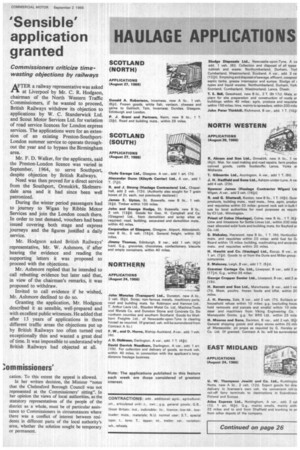'Sensible' application granted
Page 27

If you've noticed an error in this article please click here to report it so we can fix it.
Commissioners criticize timewasting objections by railways
AFTER a railway representative was asked at Liverpool by Mr. C. R. Hodgson, chairman of the North Western Traffic Commissioners, if he wanted to proceed, British Railways withdrew its objection to applications by W. C. Standerwick Ltd. and Scout Motor Services Ltd. for variation of road service licences for London express services. The applications were for an extension of an existing Preston-SouthportLondon summer service to operate throughout the year and to bypass the Birmingham area.
Mr. F. D. Walker, for the applicants, said the Preston-London licence was varied in September, 1964, to serve Southport, despite objection by British Railways.
Need was then proved for a direct service from the Southport, Ormskirk, Skelmersdale area and it had since been well patronized.
During the winter period passengers had to journey to Wigan by Ribble Motor Services and join the London coach there. In order to test demand, vouchers had been issued covering both stage and express journeys and the figures justified a daily service.
Mr. Hodgson asked British Railways' representative, Mr. W. Ashmore, if after hearing the evidence and reading the supporting letters it was proposed to proceed with the objections.
Mr. Ashmore replied that he intended to call rebutting evidence but later said that, in view of the chairman's remarks, it was proposed to withdraw.
Invited to call evidence if he wished, Mr. Ashmore declined to do so.
Granting the application, Mr. Hodgson described it as sensible, well-prepared and with excellent public witnesses. He added that after 13 years of applications in three different traffic areas the objections put up by British Railways too often turned out exceptionally thin and wasted a great deal of time. It was impossible to understand why British Railways had objected at all.
































































































































